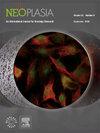DCZ0014, a novel compound in the therapy of diffuse large B-cell lymphoma via the B cell receptor signaling pathway.
IF 7.7
2区 医学
Q1 ONCOLOGY
引用次数: 0
Abstract
Diffuse large B cell lymphoma (DLBCL) is a clinical and genetically heterogeneous lymphoid malignancy. Although R-CHOP (rituximab plus cyclophosphamide, vincristine, doxorubicin, and prednisone) treatment can improve the survival rate of patients with DLBCL, more than 30% of patients exhibit treatment failure, relapse, or refractory disease. Therefore, novel drugs or targeted therapies are needed to improve the survival of patients with DLBCL. The compound DCZ0014 is a novel chemical similar to berberine. In this study, we found that DCZ0014 significantly inhibited the proliferation and activity of DLBCL cells, and induced cell apoptosis. Following treatment with DCZ0014, DLBCL cells accumulated in G0/G1-phase of the cell cycle and showed decreased mitochondrial membrane potential. Additionally, DCZ0014 inhibited DNA synthesis, enhanced DNA damage in DLBCL cells, as well as inhibited Lyn/Syk in B cell receptor signaling pathway. Further experiments demonstrated that DCZ0014 did not significantly affect peripheral blood mononuclear cells. Tumor xenograft model showed that DCZ0014 not only inhibited tumor growth but also extended the survival time of mice. Thus, DCZ0014 showed potential for clinical application in the treatment of patients with DLBCL.DCZ0014,一种通过B细胞受体信号通路治疗弥漫性大B细胞淋巴瘤的新化合物。
弥漫性大B细胞淋巴瘤(DLBCL)是一种临床和遗传异质性的淋巴细胞恶性肿瘤。虽然R-CHOP(利妥昔单抗联合环磷酰胺、新碱、多柔比星和强尼松)治疗可以提高DLBCL患者的生存率,但超过30%的患者出现治疗失败、复发或难治性疾病。因此,需要新的药物或靶向治疗来提高DLBCL患者的生存率。化合物DCZ0014是一种类似小檗碱的新型化学物质。在本研究中,我们发现DCZ0014明显抑制DLBCL细胞的增殖和活性,并诱导细胞凋亡。DCZ0014处理后,DLBCL细胞在细胞周期的G0/ g1期聚集,线粒体膜电位下降。DCZ0014抑制DNA合成,增强DLBCL细胞DNA损伤,抑制B细胞受体信号通路Lyn/Syk。进一步实验表明,DCZ0014对外周血单核细胞无明显影响。肿瘤移植模型显示,DCZ0014不仅能抑制肿瘤生长,还能延长小鼠的生存时间。因此,DCZ0014在DLBCL患者的治疗中具有临床应用潜力。
本文章由计算机程序翻译,如有差异,请以英文原文为准。
求助全文
约1分钟内获得全文
求助全文
来源期刊

Neoplasia
ONCOLOGY-
自引率
2.10%
发文量
82
期刊介绍:
Neoplasia publishes the results of novel investigations in all areas of oncology research. The title Neoplasia was chosen to convey the journal’s breadth, which encompasses the traditional disciplines of cancer research as well as emerging fields and interdisciplinary investigations. Neoplasia is interested in studies describing new molecular and genetic findings relating to the neoplastic phenotype and in laboratory and clinical studies demonstrating creative applications of advances in the basic sciences to risk assessment, prognostic indications, detection, diagnosis, and treatment. In addition to regular Research Reports, Neoplasia also publishes Reviews and Meeting Reports. Neoplasia is committed to ensuring a thorough, fair, and rapid review and publication schedule to further its mission of serving both the scientific and clinical communities by disseminating important data and ideas in cancer research.
 求助内容:
求助内容: 应助结果提醒方式:
应助结果提醒方式:


